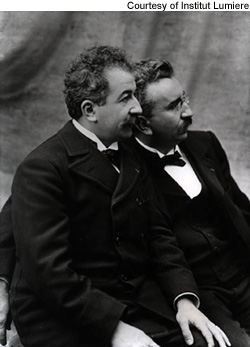|
|
March 1985
The first cinematograph
On 19 March 1895, Louis Lumière shot Leaving the Lumière Factory, the first film in history shot with a cinematograph.
Inspired by a demonstration of Thomas Edison’s peephole kinetoscope in Paris in 1894, the Lumière brothers devised a machine that would combine the functions of a camera and a projector. In 1895, Louis Lumière came up with the cinematograph.
While Edison’s kinetoscope would permit only one person to view moving pictures at a time, the cinematograph system allowed more than one person to watch a film at the same time and thus raised the level of enjoyment.
Another important advantage of the cinematograph was that, unlike Edison’s bulky camera, which could only be used in a studio, the Lumière machine was light and suitable for outdoor use.
Besides, the cinematograph reduced the frames-per-second speed from Edison’s 48 to 16, so it used less film and operated more smoothly than the Edison camera.
Born in 1862 and 1864, Auguste and Louis Lumière were the sons of a photographic factory owner. Their father, Antoine Lumière, first a painter and then a photographer in Besançon, moved the family to Lyon in 1870. There he established a photographic studio in the center of the city. Both of the brothers worked in the family factory. By 1895, the Lumière factory was the leading European manufacturer of photographic products.
Louis Lumière’s invention began the motion picture era. On 28 December 1895, the Lumière brothers held their first public screening to a paying audience at the Grand Café in Paris.

Louis and Auguste Lumiere.
"Film lovers are sick people." Francois Truffaut (1932-1984), French film director, screenwriter and critic. His landmark essay, A Certain Tendency in the French Cinema, marked the start of the French New Wave. He also came to prominence with the New Wave group in the late 1950s and the 1960s.
“I like a film to have a beginning, a middle and an end, but not necessarily in that order.” Jean-Luc Godard (1930- ), French film director, linchpin of French New Wave, and possibly the most influential filmmaker of the postwar era.
"Self-plagiatism is style" Alfred Hitchcock (1899-1980), American filmmaker known as “the Master of Suspense”.
“Censorship is advertising paid by the government.” Federico Fellini (1920-1993), Italian film director and screenwriter who was one of the most celebrated and distinctive filmmakers of the period after World War II.
“A film is — or should be — more like music than like fiction. It should be a progression of moods and feelings.”
“The cinema is an invention without a future.” |